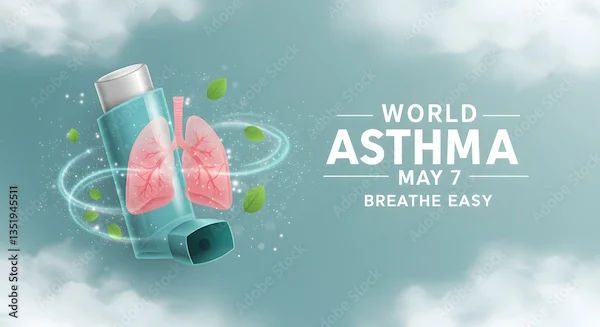Asthma: Understanding Its Non-Communicable Nature
Learn why asthma is classified as a non-communicable disease. Understand its causes, symptoms, and management while debunking myths about its transmission and highlighting the importance of long-term care.

Written by Dr. J T Hema Pratima
Reviewed by Dr. Shaik Abdul Kalam MD (Physician)
Last updated on 24th Jul, 2025

In this article, we’ll break down what asthma is, its symptoms, causes, and how you can manage it effectively to lead a healthy and active life.
What is Asthma?
Asthma is a chronic (long-term) condition that affects the airways (breathing tubes) in the lungs. When a person has asthma, their airways become inflamed, narrow, and produce extra mucus, making it difficult to breathe. This can lead to symptoms like wheezing, coughing, chest tightness, and shortness of breath.
Common Symptoms of Asthma
Wheezing: A whistling or squeaky sound while breathing.
Shortness of breath: Feeling like you can’t get enough air.
Chest tightness: A feeling of pressure or squeezing in the chest.
Coughing: Especially at night or early morning.
These symptoms can vary from mild to severe and may come and go. Some people experience asthma attacks, where symptoms worsen suddenly and require immediate treatment.
Why is Asthma Non-Communicable?
Unlike infections such as the flu or tuberculosis, asthma is not caused by bacteria or viruses and cannot spread from person to person. Instead, it is influenced by a combination of genetic and environmental factors, including:
Family history: If a parent or sibling has asthma, you may be more likely to develop it.
Allergies: Pollen, dust mites, pet dander, or mould can trigger asthma.
Environmental factors: Air pollution, smoke, or strong odours can worsen symptoms.
Respiratory infections: Colds or flu can sometimes trigger asthma flare-ups.
Physical activity: Exercise-induced asthma can occur in some people.
Since asthma is not contagious, you don’t have to worry about "catching" it from someone else. However, understanding and managing triggers is key to controlling symptoms.
How Does Asthma Affect Daily Life?
For some, asthma is a minor inconvenience, while for others, it can interfere with daily activities. Uncontrolled asthma may lead to:
Frequent coughing or wheezing at night, disrupting sleep.
Difficulty exercising or playing sports.
Missed school or work due to flare-ups.
Emergency hospital visits in severe cases.
The good news is that with proper management, most people with asthma can live active, healthy lives without major restrictions.
Tips for Managing Asthma
While asthma cannot be cured, it can be effectively controlled with the right approach. Here are some key strategies:
1. Follow Your Asthma Action Plan
If you have asthma, your doctor may provide an asthma action plan—a personalised guide that helps you:
Recognise early symptoms.
Know which medications to take and when.
Identify when to seek emergency help.
For More Tips Consult Top Specialists
2. Take Medications as Prescribed
Controller medications (inhaled corticosteroids): Used daily to reduce inflammation.
Quick-relief inhalers (bronchodilators): Used during flare-ups to open airways quickly.
Never skip doses, even if you feel fine, as stopping medication can lead to worsening symptoms.
3. Avoid Triggers
Keep your home clean and dust-free.
Use allergy-proof bedding if dust mites are a problem.
Avoid smoking and secondhand smoke.
Stay indoors on high-pollution or high-pollen days.
4. Stay Active Safely
Exercise is important, but if you have exercise-induced asthma:
Warm up before workouts.
Use your inhaler before activity if recommended.
Choose activities like swimming, which may be easier on the lungs.
5. Monitor Your Breathing
Peak flow meters or asthma apps can help track lung function and detect early signs of worsening asthma.
When to See a Doctor?
If you or a loved one experience:
Frequent asthma symptoms (more than twice a week).
Nighttime awakenings due to coughing or wheezing.
Increased use of a rescue inhaler.
Difficulty speaking or walking due to shortness of breath.
It may be time to consult a doctor. Apollo 24|7 offers convenient online consultations with specialists who can help adjust your treatment plan for better control.
Conclusion
Asthma is a manageable condition, and understanding its non-communicable nature helps reduce unnecessary fears. By recognising triggers, following a treatment plan, and making healthy lifestyle choices, you can keep asthma under control and enjoy a full, active life.
If you suspect you have asthma or need help managing symptoms, consider booking a consultation with a healthcare provider through Apollo 24|7 for expert guidance and support.
Consult Top Specialists
For More Tips Consult Top Specialists

Dr. Syed Ismail Ali
General Practitioner
7 Years • MBBS
Hyderabad
Apollo 24|7 Clinic, Hyderabad

Dr D M Karthik
General Practitioner
4 Years • MBBS, Fellowship in Diabetes Mellitus, Advance certificate in Diabetes Mellitus, Derma Nutrition Certification
Visakhapatnam
Apollo 24|7 Clinic - Andhra Pradesh, Visakhapatnam

Dr. M L Ezhilarasan
General Practitioner
6 Years • MBBS
Visakhapatnam
Apollo 24|7 Clinic - Andhra Pradesh, Visakhapatnam

Dr. Mohammed Kamran
General Practitioner
5 Years • MBBS, FIDM
Nashik
Apollo 24|7 Clinic - Maharashtra, Nashik

Dr. D Bhanu Prakash
General Practitioner
10 Years • MBBS, AFIH, Advanced certificate in critical care medicine, Fellowship in critical care medicine
Hyderabad
Apollo 24|7 Clinic, Hyderabad
Consult Top Specialists

Dr. Syed Ismail Ali
General Practitioner
7 Years • MBBS
Hyderabad
Apollo 24|7 Clinic, Hyderabad

Dr D M Karthik
General Practitioner
4 Years • MBBS, Fellowship in Diabetes Mellitus, Advance certificate in Diabetes Mellitus, Derma Nutrition Certification
Visakhapatnam
Apollo 24|7 Clinic - Andhra Pradesh, Visakhapatnam

Dr. M L Ezhilarasan
General Practitioner
6 Years • MBBS
Visakhapatnam
Apollo 24|7 Clinic - Andhra Pradesh, Visakhapatnam

Dr. Mohammed Kamran
General Practitioner
5 Years • MBBS, FIDM
Nashik
Apollo 24|7 Clinic - Maharashtra, Nashik

Dr. D Bhanu Prakash
General Practitioner
10 Years • MBBS, AFIH, Advanced certificate in critical care medicine, Fellowship in critical care medicine
Hyderabad
Apollo 24|7 Clinic, Hyderabad

